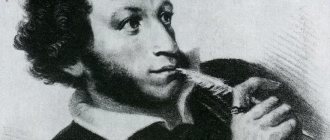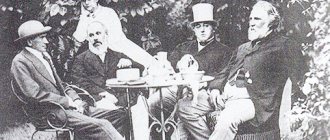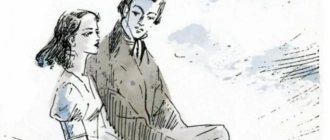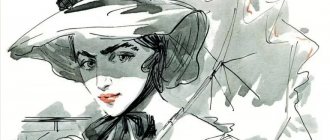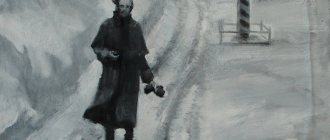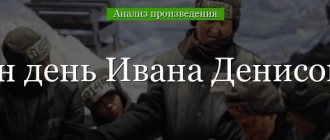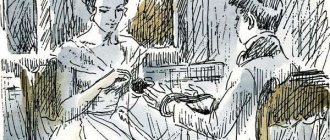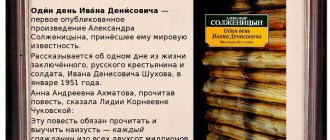Ivan Turgenev - Raspberry water
1
Ivan Sergeevich Turgenev
RASPBERRY WATER
At the beginning of August the heat is often unbearable. At this time, from twelve to three o’clock, the most determined and concentrated person is unable to hunt and the most devoted dog begins to “clean the hunter’s spurs,” that is, follows him at a pace, painfully narrowing his eyes and sticking out his tongue exaggeratedly, and in response to reproaches his master humiliatingly wags his tail and expresses embarrassment on his face, but does not move forward. It was on such a day that I happened to be hunting. For a long time I resisted the temptation to lie down somewhere in the shade, even for a moment; For a long time my tireless dog continued to scour the bushes, although she herself, apparently, did not expect anything worthwhile from her feverish activity. The suffocating heat finally forced me to think about conserving the last of our strength and abilities. Somehow I dragged myself to the Ista River, already familiar to my indulgent readers, went down the steep slope and walked along the yellow and damp sand in the direction of the spring, known throughout the area as “Raspberry Water”. This spring flows from a cleft in the bank, which little by little turned into a small but deep ravine, and twenty steps from there it flows into the river with a cheerful and chatty noise. Oak bushes grew along the slopes of the ravine; short, velvety grass grows green near the spring; the sun's rays almost never touch its cold, silvery moisture. I got to the spring; on the grass lay a birch bark scoop, left by a passing man for the common benefit. I got drunk, lay down in the shade and looked around. Near the bay, formed by the confluence of a spring into the river and therefore always covered with small ripples, two old men sat with their backs to me. One, rather stout and tall, in a neat dark green caftan and a down cap, was fishing; the other, thin and small, in a patched fly frock coat and without a hat, held a pot of worms on his knees and occasionally ran his hand over his gray head, as if wanting to protect it from the sun. I looked at him more closely and recognized him as Shumikhin’s Stepushka. I ask the reader's permission to introduce this man to him.
A few miles from my village is the large village of Shumikhino, with a stone church erected in the name of Saints Kozma and Damian. Opposite this church there were once vast manorial mansions, surrounded by various outbuildings, services, workshops, stables, dirt and carriage sheds, baths and temporary kitchens, outbuildings for guests and for managers, flower greenhouses, swings for the people and other, more or less useful, buildings. Rich landowners lived in these mansions, and everything was going as it should, when suddenly, one fine morning, all this grace burned to the ground. The gentlemen moved to another nest; the estate was deserted. The vast ashes turned into a vegetable garden, cluttered here and there with piles of bricks, the remains of the previous foundations. They quickly put together a hut from the surviving logs, covered it with baroque planks, bought ten years ago to build a pavilion in the Gothic style, and settled the gardener Mitrofan with his wife Aksinya and seven children in it. Mitrofan was ordered to deliver greens and vegetables to the master’s table, one and a half hundred miles away; Aksinya was entrusted with the supervision of a Tyrolean cow, bought in Moscow for a lot of money, but, unfortunately, deprived of any ability to reproduce and therefore, since the acquisition, has not given milk; They gave her a crested smoky drake, the only “master’s” bird; The children, due to their youth, were not assigned any positions, which, however, did not in the least prevent them from becoming completely lazy. I happened to spend the night with this gardener twice; In passing, I took cucumbers from him, which, God knows why, even in summer were distinguished by their size, crappy watery taste and thick yellow skin. It was with him that I saw Stepushka for the first time. Apart from Mitrofan and his family and the old deaf ktitor Gerasim, who lived for Christ’s sake in the closet of a crooked soldier’s wife, not a single servant remained in Shumikhino, because Stepushka, with whom I intend to introduce the reader, could not be considered either a person in general or the courtyard in particular.
Every person has at least some position in society, at least some connections; every servant is given, if not a salary, then at least a so-called “percent” one: Stepushka received absolutely no benefits, was not related to anyone, no one knew about his existence. This man didn’t even have a past; they didn't talk about him; Even according to the audit, he was hardly listed. There were dark rumors that he had once been someone's valet; but who is he, where is he from, whose son, how did he become one of Shumikha’s subjects, how did he get the fly-fly caftan he has worn since time immemorial, where does he live, what does he live with - absolutely no one had the slightest idea about this, and indeed to say, no one was interested in these questions. Grandfather Trofimych, who knew the pedigree of all the servants in the ascending line up to the fourth generation, and that time only said that, they say, I remember that Stepan is a relative of the Turkish woman whom the late master, foreman Alexey Romanych, deigned to bring from a trip on a convoy. Even, it happened, on holidays, days of general salary and treats with bread and salt, buckwheat pies and green wine, according to the old Russian custom - even on these days Stepushka did not appear at the exposed tables and barrels, did not bow, did not approach the master's room. hand, did not drink a glass in spirit under the master's gaze and for the master's health - a glass filled with the fat hand of the clerk; unless some kind soul, passing by, would give the poor fellow a half-eaten piece of pie. On Easter Sunday they said Christ to him, but he did not turn up his oily sleeve, did not take his red testicle out of his back pocket, did not present it, gasping and blinking, to the young gentlemen or even to the lady herself. In the summer he lived in a cage behind the chicken coop, and in the winter in the dressing room; in severe frosts he spent the night in the hayloft. They got used to seeing him, sometimes they even gave him a kick, but no one spoke to him, and he himself, it seems, never opened his mouth. After the fire, this abandoned man took refuge, or, as the Orlovites say, “hunkered down” with the gardener Mitrofan. The gardener did not touch him, did not tell him: live with me, and did not drive him away. Stepushka did not even live with the gardener: he lived and hovered in the garden. He walked and moved without any noise; he sneezed and coughed into his hand, not without fear; always fussing and fussing quietly, like an ant - and all for food, just food. And for sure, if he had not worried about his food from morning to evening, my Stepushka would have died of hunger. It’s a bad thing not to know in the morning what you’ll be full of by the evening! Either Stepushka sits under the fence and gnaws a radish, or sucks a carrot, or crumbles a dirty head of cabbage for himself; then he drags a bucket of water somewhere and groans; then he puts a light under the pot and throws some black pieces from his bosom into the pot; Then in his closet he taps a piece of wood, nails on a nail, and sets up a shelf for bread. And he does all this silently, as if from around the corner: lo and behold, he’s already hidden. And then suddenly he’ll be away for two days; Of course, no one notices his absence... Look, he’s here again, again, somewhere near the fence, he’s secretly putting wood chips under the taganchik. His face is small, his eyes are yellow, his hair goes all the way to his eyebrows, his nose is pointed, his ears are large and transparent, like those of a bat, his beard seems to have been shaved two weeks ago, and it is never less or more. I met this Stepushka on the banks of the Ista River in the company of another old man.
I walked up to them, said hello and sat down next to them. In Stepushka’s comrade I also recognized an acquaintance: he was a freed man of Count Pyotr Ilyich ***, Mikhailo Savelyev, nicknamed Fog. He lived with a consumptive tradesman from Bolkhov, the owner of an inn where I stayed quite often. Young officials and other unoccupied people driving along the big Oryol road (merchants, immersed in their striped feather beds, have no time) can still notice, not far from the large village of Troitsky, a huge wooden house with two floors, completely abandoned, with a collapsed roof. and tightly boarded windows, pushed out onto the very road. At noon, in clear, sunny weather, nothing can be imagined sadder than this ruin. Count Pyotr Ilyich, a famous hospitable man and a rich nobleman of the old century, once lived here. It used to be that the entire province gathered at his place, danced and had a great time, with the deafening thunder of home-grown music, the chatter of beetroot and Roman candles; and, probably, more than one old woman, now driving past the deserted boyars’ chambers, will sigh and remember bygone times and bygone youth. The count feasted for a long time, walked for a long time, smiling affably, in the crowd of obsequious guests; but his property, unfortunately, was not enough to last his whole life. Having gone bankrupt all around, he went to St. Petersburg to look for a place for himself and died in a hotel room without waiting for any decision. Tuman served as his butler and received a vacation pay during the count’s lifetime. He was a man of about seventy, with a regular and pleasant face. He smiled almost constantly, as only people of Catherine’s time smile now: good-naturedly and majestically; while talking, he slowly moved and closed his lips, squinted his eyes affectionately and pronounced the words somewhat nasally. He also blew his nose and sniffed tobacco slowly, as if he was doing something.
1
“Raspberry Water”, Ivan Turgenev
At the beginning of August the heat is often unbearable. At this time, from twelve to three o’clock, the most determined and concentrated person is unable to hunt and the most devoted dog begins to “clean the hunter’s spurs,” that is, follows him at a pace, painfully narrowing his eyes and sticking out his tongue exaggeratedly, and in response to reproaches his master humiliatingly wags his tail and expresses embarrassment on his face, but does not move forward. It was on such a day that I happened to be hunting. For a long time I resisted the temptation to lie down somewhere in the shade, even for a moment; For a long time my tireless dog continued to scour the bushes, although she herself, apparently, did not expect anything worthwhile from her feverish activity. The suffocating heat finally forced me to think about conserving the last of our strength and abilities. Somehow I dragged myself to the Ista River, already familiar to my indulgent readers, went down the steep slope and walked along the yellow and damp sand in the direction of the spring, known throughout the area as “Raspberry Water”. This spring flows from a cleft in the bank, which little by little turned into a small but deep ravine, and twenty steps from there it flows into the river with a cheerful and chatty noise. Oak bushes grew along the slopes of the ravine; short, velvety grass grows green near the spring; the sun's rays almost never touch its cold, silvery moisture. I got to the spring; on the grass lay a birch bark scoop, left by a passing man for the common benefit. I got drunk, lay down in the shade and looked around. Near the bay, formed by the confluence of a spring into the river and therefore always covered with small ripples, two old men sat with their backs to me. One, rather stout and tall, in a neat dark green caftan and a down cap, was fishing; the other, thin and small, in a patched fly frock coat and without a hat, held a pot of worms on his knees and occasionally ran his hand over his gray head, as if wanting to protect it from the sun. I looked at him more closely and recognized him as Shumikhin’s Stepushka. I ask the reader's permission to introduce this man to him.
A few miles from my village is the large village of Shumikhino, with a stone church erected in the name of Saints Kozma and Damian. Opposite this church there were once vast manorial mansions, surrounded by various outbuildings, services, workshops, stables, dirt and carriage sheds, baths and temporary kitchens, outbuildings for guests and for managers, flower greenhouses, swings for the people and other, more or less useful, buildings. Rich landowners lived in these mansions, and everything was going as it should, when suddenly, one fine morning, all this grace burned to the ground. The gentlemen moved to another nest; the estate was deserted. The vast ashes turned into a vegetable garden, cluttered here and there with piles of bricks, the remains of the previous foundations. They quickly put together a hut from the surviving logs, covered it with baroque planks, bought ten years ago to build a pavilion in the Gothic style, and settled the gardener Mitrofan with his wife Aksinya and seven children in it. Mitrofan was ordered to deliver greens and vegetables to the master’s table, one and a half hundred miles away; Aksinya was entrusted with the supervision of a Tyrolean cow, bought in Moscow for a lot of money, but, unfortunately, deprived of any ability to reproduce and therefore, since the acquisition, has not given milk; They gave her a crested smoky drake, the only “master’s” bird; The children, due to their youth, were not assigned any positions, which, however, did not in the least prevent them from becoming completely lazy. I happened to spend the night with this gardener twice; In passing, I took cucumbers from him, which, God knows why, even in summer were distinguished by their size, crappy watery taste and thick yellow skin. It was with him that I saw Stepushka for the first time. Apart from Mitrofan and his family and the old deaf ktitor Gerasim, who lived for Christ’s sake in the closet of a crooked soldier’s wife, not a single servant remained in Shumikhino, because Stepushka, with whom I intend to introduce the reader, could not be considered either a person in general or the courtyard in particular.
Every person has at least some position in society, at least some connections; every servant is given, if not a salary, then at least a so-called “percent” one: Stepushka received absolutely no benefits, was not related to anyone, no one knew about his existence. This man didn’t even have a past; they didn't talk about him; Even according to the audit, he was hardly listed. There were dark rumors that he had once been someone's valet; but who is he, where is he from, whose son, how did he become one of Shumikha’s subjects, how did he get the fly-fly caftan he has worn since time immemorial, where does he live, what does he live with - absolutely no one had the slightest idea about this, and indeed to say, no one was interested in these questions. Grandfather Trofimych, who knew the pedigree of all the servants in the ascending line up to the fourth generation, and that time only said that, they say, I remember that Stepan is a relative of the Turkish woman whom the late master, foreman Alexey Romanych, deigned to bring from a trip on a convoy. Even, it happened, on holidays, days of general salary and treats with bread and salt, buckwheat pies and green wine, according to the old Russian custom - even on these days Stepushka did not appear at the exposed tables and barrels, did not bow, did not approach the master's room. hand, did not drink a glass in spirit under the master's gaze and for the master's health - a glass filled with the fat hand of the clerk; unless some kind soul, passing by, would give the poor fellow a half-eaten piece of pie. On Easter Sunday they said Christ to him, but he did not turn up his oily sleeve, did not take his red testicle out of his back pocket, did not present it, gasping and blinking, to the young gentlemen or even to the lady herself. In the summer he lived in a cage behind the chicken coop, and in the winter in the dressing room; in severe frosts he spent the night in the hayloft. They got used to seeing him, sometimes they even gave him a kick, but no one spoke to him, and he himself, it seems, never opened his mouth. After the fire, this abandoned man took refuge, or, as the Orlovites say, “hunkered down” with the gardener Mitrofan. The gardener did not touch him, did not tell him: live with me, and did not drive him away. Stepushka did not even live with the gardener: he lived and hovered in the garden. He walked and moved without any noise; he sneezed and coughed into his hand, not without fear; always fussing and fussing quietly, like an ant - and all for food, just food. And for sure, if he had not worried about his food from morning to evening, my Stepushka would have died of hunger. It’s a bad thing not to know in the morning what you’ll be full of by the evening! Either Stepushka sits under the fence and gnaws a radish, or sucks a carrot, or crumbles a dirty head of cabbage for himself; then he drags a bucket of water somewhere and groans; then he puts a light under the pot and throws some black pieces from his bosom into the pot; Then in his closet he taps a piece of wood, nails on a nail, and sets up a shelf for bread. And he does all this silently, as if from around the corner: lo and behold, he’s already hidden. And then suddenly he’ll be away for two days; Of course, no one notices his absence... Look, he’s here again, again, somewhere near the fence, he’s secretly putting wood chips under the taganchik. His face is small, his eyes are yellow, his hair goes all the way to his eyebrows, his nose is pointed, his ears are large and transparent, like those of a bat, his beard seems to have been shaved two weeks ago, and it is never less or more. I met this Stepushka on the banks of the Ista River in the company of another old man.
I walked up to them, said hello and sat down next to them. In Stepushka’s comrade I also recognized an acquaintance: he was a freed man of Count Pyotr Ilyich
* * *
, Mikhailo Savelyev, nicknamed Fog. He lived with a consumptive tradesman from Bolkhov, the owner of an inn where I stayed quite often. Young officials and other unoccupied people driving along the big Oryol road (merchants, immersed in their striped feather beds, have no time) can still notice, not far from the large village of Troitsky, a huge wooden house with two floors, completely abandoned, with a collapsed roof. and tightly boarded windows, pushed out onto the very road. At noon, in clear, sunny weather, nothing can be imagined sadder than this ruin. Count Pyotr Ilyich, a famous hospitable man and a rich nobleman of the old century, once lived here. It used to be that the entire province gathered at his place, danced and had a great time, with the deafening thunder of home-grown music, the chatter of beetroot and Roman candles; and, probably, more than one old woman, now driving past the deserted boyars’ chambers, will sigh and remember bygone times and bygone youth. The count feasted for a long time, walked for a long time, smiling affably, in the crowd of obsequious guests; but his property, unfortunately, was not enough to last his whole life. Having gone bankrupt all around, he went to St. Petersburg to look for a place for himself and died in a hotel room without waiting for any decision. Tuman served as his butler and received a vacation pay during the count’s lifetime. He was a man of about seventy, with a regular and pleasant face. He smiled almost constantly, as only people of Catherine’s time smile now: good-naturedly and majestically; while talking, he slowly moved and closed his lips, squinted his eyes affectionately and pronounced the words somewhat nasally. He also blew his nose and sniffed tobacco slowly, as if he was doing something.
“Well, Mikhailo Savelich,” I began, “did you catch any fish?”
- But if you please, look into the net: I caught two perches and about five chubs... Show me, Styopa.
Stepushka held out his whip to me.
- How are you doing, Stepan? - I asked him.
“And... and... and... nor... nothing, oh, little by little,” Stepan answered, stuttering, as if he were rolling pounds with his tongue.
- Is Mitrofan healthy?
- Hey, how... well, father.
The poor man turned away.
“It’s not biting well,” said Fog, “it hurts because it’s hot; the fish is all huddled under the bushes, sleeping... Put on a worm, Styopa. (Styopa took out a worm, put it in his palm, slapped it twice, put it on a hook, spat on it and gave it to Fog.) Thank you, Styopa... And you, father,” he continued, turning to me, “would you like to hunt?”
Raspberry water :: Turgenev Ivan Sergeevich
Abstract: “Rarely have two difficultly combined elements been combined to such an extent, in such complete balance: sympathy for humanity and artistic feeling,” F.I. admired “Notes of a Hunter.” Tyutchev. The series of essays “Notes of a Hunter” basically took shape over five years (1847-1852), but Turgenev continued to work on the book. To the twenty-two early essays, Turgenev added three more in the early 1870s. About two dozen more plots remained in sketches, plans and testimonies of contemporaries. Naturalistic descriptions of the life of pre-reform Russia in “Notes of a Hunter” develop into reflections on the mysteries of the Russian soul. The peasant world grows into myth and opens up into nature, which turns out to be a necessary background for almost every story. Poetry and prose, light and shadows intertwine here in unique, whimsical images.
———————————————
Ivan Sergeevich Turgenev
RASPBERRY WATER
At the beginning of August the heat is often unbearable. At this time, from twelve to three o’clock, the most determined and concentrated person is unable to hunt and the most devoted dog begins to “clean the hunter’s spurs,” that is, follows him at a pace, painfully narrowing his eyes and sticking out his tongue exaggeratedly, and in response to reproaches his master humiliatingly wags his tail and expresses embarrassment on his face, but does not move forward. It was on such a day that I happened to be hunting. For a long time I resisted the temptation to lie down somewhere in the shade, even for a moment; For a long time my tireless dog continued to scour the bushes, although she herself, apparently, did not expect anything worthwhile from her feverish activity. The suffocating heat finally forced me to think about conserving the last of our strength and abilities. Somehow I dragged myself to the Ista River, already familiar to my indulgent readers, went down the steep slope and walked along the yellow and damp sand in the direction of the spring, known throughout the area as “Raspberry Water”. This spring flows from a cleft in the bank, which little by little turned into a small but deep ravine, and twenty steps from there it flows into the river with a cheerful and chatty noise. Oak bushes grew along the slopes of the ravine; short, velvety grass grows green near the spring; the sun's rays almost never touch its cold, silvery moisture. I got to the spring; on the grass lay a birch bark scoop, left by a passing man for the common benefit. I got drunk, lay down in the shade and looked around. Near the bay, formed by the confluence of a spring into the river and therefore always covered with small ripples, two old men sat with their backs to me. One, rather stout and tall, in a neat dark green caftan and a down cap, was fishing; the other, thin and small, in a patched fly frock coat and without a hat, held a pot of worms on his knees and occasionally ran his hand over his gray head, as if wanting to protect it from the sun. I looked at him more closely and recognized him as Shumikhin’s Stepushka. I ask the reader's permission to introduce this man to him.
A few miles from my village is the large village of Shumikhino, with a stone church erected in the name of Saints Kozma and Damian. Opposite this church there were once vast manorial mansions, surrounded by various outbuildings, services, workshops, stables, dirt and carriage sheds, baths and temporary kitchens, outbuildings for guests and for managers, flower greenhouses, swings for the people and other, more or less useful, buildings. Rich landowners lived in these mansions, and everything was going as it should, when suddenly, one fine morning, all this grace burned to the ground. The gentlemen moved to another nest; the estate was deserted.
Raspberry water
At the beginning of August the heat is often unbearable. At this time, from twelve to three o’clock, the most determined and concentrated person is not able to hunt, and the most devoted dog begins to “clean the hunter’s spurs,” that is, follows him at a pace, painfully narrowing his eyes and sticking out his tongue exaggeratedly, and in response to reproaching his master, humiliatingly wags his tail and expresses embarrassment on his face, but does not move forward. It was on such a day that I happened to be hunting. For a long time I resisted the temptation to lie down somewhere in the shade even for a moment; For a long time my tireless dog continued to scour the bushes, although she herself, apparently, did not expect anything worthwhile from her feverish activity. The suffocating heat finally forced me to think about conserving the last of our strength and abilities. Somehow I dragged myself to the Ista River, already familiar to my indulgent readers, went down the steep slope and walked along the yellow and damp sand in the direction of the spring, known throughout the area as “Raspberry Water”. This spring flows from a cleft in the bank, which little by little turned into a small but deep ravine, and twenty steps from there it flows into the river with a cheerful and chatty noise. Oak bushes grew along the slopes of the ravine; short, velvety grass grows green near the spring; the sun's rays almost never touch its cold, silvery moisture. I got to the spring; on the grass lay a birch bark scoop, left by a passing man for the common benefit. I got drunk, lay down in the shade and looked around. Near the bay, formed by the confluence of a spring into the river and therefore always covered with small ripples, two old men sat with their backs to me. One, rather stout and tall, in a neat dark green caftan and a down cap, was fishing; the other, thin and small, in a patched fly frock coat and without a hat, held a pot of worms on his knees and occasionally ran his hand over his gray head, as if wanting to protect it from the sun. I looked at him more closely and recognized him as Shumikhin’s Stepushka. I ask the reader's permission to introduce this man to him.
A few miles from my village is the large village of Shumikhino, with a stone church erected in the name of Saints Kozma and Damian. Opposite this church there were once vast manorial mansions, surrounded by various outbuildings, services, workshops, stables, dirt and carriage sheds, baths and temporary kitchens, outbuildings for guests and for managers, flower greenhouses, swings for the people and other, more or less useful, buildings. Rich landowners lived in these mansions, and everything was going as it should, when suddenly, one fine morning, all this grace burned to the ground. The gentlemen moved to another nest; the estate was deserted. The vast ashes turned into a vegetable garden, cluttered here and there with piles of bricks, the remains of the previous foundations. They quickly put together a hut from the surviving logs, covered it with baroque planks, bought ten years ago to build a pavilion in the Gothic style, and settled the gardener Mitrofan with his wife Aksinya and seven children in it. Mitrofan was ordered to deliver greens and vegetables to the master’s table, one and a half hundred miles away; Aksinya was entrusted with the supervision of a Tyrolean cow, bought in Moscow for a lot of money, but, unfortunately, deprived of any ability to reproduce and therefore, since the acquisition, has not given milk; They gave her a crested smoky drake, the only “master’s” bird; the children, due to their young age, were not assigned any positions, which, however, did not in the least prevent them from becoming completely lazy. I happened to spend the night with this gardener twice; In passing, I took cucumbers from him, which, God knows why, even in summer were distinguished by their size, crappy watery taste and thick yellow skin. It was with him that I saw Stepushka for the first time. Apart from Mitrofan and his family and the old deaf ktitor Gerasim, who lived for Christ’s sake in the closet of a crooked soldier’s wife, not a single servant remained in Shumikhino, because Stepushka, with whom I intend to introduce the reader, could not be considered either a person in general or the courtyard in particular.
